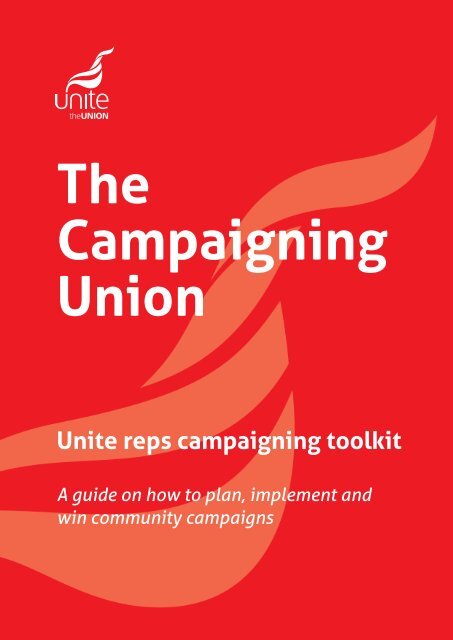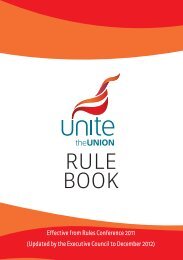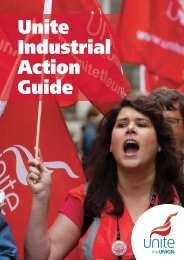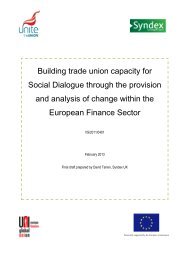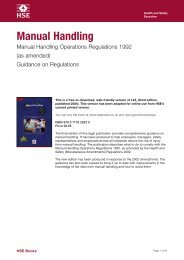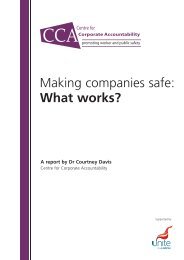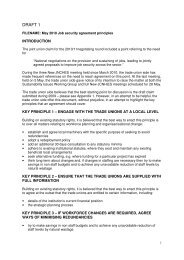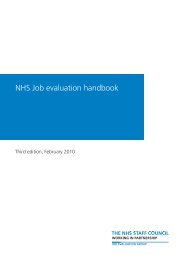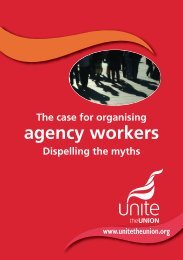Unite guide to campaigning - Unite the Union
Unite guide to campaigning - Unite the Union
Unite guide to campaigning - Unite the Union
You also want an ePaper? Increase the reach of your titles
YUMPU automatically turns print PDFs into web optimized ePapers that Google loves.
The<br />
Campaigning<br />
<strong>Union</strong><br />
<strong>Unite</strong> reps <strong>campaigning</strong> <strong>to</strong>olkit<br />
A <strong>guide</strong> on how <strong>to</strong> plan, implement and<br />
win community campaigns
Contents<br />
1. Introduction 3<br />
2. Planning your campaign – <strong>the</strong> basics 3<br />
3. Organising 5<br />
4. Campaign, actions and tactics 7<br />
5. Publicising your campaign 8<br />
6. “New media” 14<br />
7. Lobbying, political <strong>campaigning</strong> and 15<br />
influencing decision makers<br />
8. Private and Not for Profit organisations 17<br />
9. Recruitment 18<br />
10. Evaluating your campaign 18<br />
11. Conclusion 18<br />
12. Useful contacts and addresses 19<br />
2
Introduction<br />
<strong>Unite</strong> believes that YOUR ORGANISATION and YOUR COMMUNITY is worth fighting<br />
for! Toge<strong>the</strong>r we can s<strong>to</strong>p <strong>the</strong> cuts and build a better more inclusive and just society<br />
for <strong>the</strong> future.<br />
Campaigning is fundamental <strong>to</strong> a strong civil society and democracy. Democracy works best with<br />
active, informed and organised communities that take control over <strong>the</strong>ir own lives <strong>to</strong> work for<br />
social improvements for all.<br />
This <strong>guide</strong> aims <strong>to</strong> give <strong>Unite</strong> members <strong>the</strong> skills and knowledge <strong>to</strong> plan, implement and win<br />
campaigns about issues facing <strong>the</strong>m, <strong>the</strong>ir community and <strong>the</strong> organisations <strong>the</strong>y work for.<br />
Trade unions have a proud record of <strong>campaigning</strong> both <strong>to</strong> improve <strong>the</strong> terms and conditions of<br />
our members and on broad issues that effect society as a whole. All <strong>the</strong> major improvements in<br />
social and employment legislation – including <strong>the</strong> welfare state, <strong>the</strong> NHS, free education, health<br />
and safety, challenging discrimination, and <strong>the</strong> national minimum wage - are as a direct result of<br />
trade union and community <strong>campaigning</strong>. These long and hard-fought national campaigns are<br />
only one side of <strong>campaigning</strong>. Just as important are <strong>the</strong> campaigns being run locally in<br />
communities and inside workplaces up and down <strong>the</strong> UK and Ireland.<br />
“If we fight we may not always win, but if we don't fight we will surely lose.”<br />
Planning your campaign – <strong>the</strong> basics<br />
When starting a new campaign it is crucial <strong>to</strong> think strategically about what you hope <strong>to</strong> achieve.<br />
It is no good rushing off <strong>to</strong> organise demonstrations, public meetings or leafleting without first<br />
understanding how this will help your cause.<br />
A good start is <strong>to</strong> consider what a campaign actually is. This definition can help:<br />
“A campaign is an organised and coherent series of actions and objectives that<br />
<strong>to</strong>ge<strong>the</strong>r work <strong>to</strong>wards <strong>the</strong> achievement of a big over-arching aim.”<br />
What does this mean?<br />
1. AIM: First define your aim/purpose. This is <strong>the</strong> outcome that <strong>the</strong> campaign hopes <strong>to</strong> achieve<br />
in order <strong>to</strong> be successful (e.g. save a local youth centre, s<strong>to</strong>p cuts <strong>to</strong> legal aid, change<br />
government policy on disability). This aim is <strong>the</strong> final destination that all campaign activities<br />
should work <strong>to</strong>wards.<br />
It can help <strong>to</strong> write a short ‘mission statement’ – yes, it’s an irritating phrase, but you do need <strong>to</strong><br />
3
define precisely what you are trying <strong>to</strong> achieve. By discussing your aims at <strong>the</strong> beginning of your<br />
campaign – and sticking <strong>to</strong> <strong>the</strong>m - you will be less likely <strong>to</strong> get sidetracked in<strong>to</strong> tackling o<strong>the</strong>r<br />
issues.<br />
2. OBJECTIVES: These are smaller more achievable outcomes that build <strong>to</strong>wards fulfilling<br />
your AIM. For example attracting media attention or raising awareness, building a large local<br />
<strong>campaigning</strong> group, bringing local councillors onside. It is also important <strong>to</strong> consider who<br />
can actually influence your overall campaign aim?<br />
3. TACTICS AND ACTIONS: Once you are clear on your AIM and OBJECTIVES you can plan<br />
<strong>the</strong> TACTICS and activities that you need <strong>to</strong> make it happen. Writing and distributing<br />
leaflets, setting up an email or twitter account, organising a public meeting or staging a<br />
sit-in in your local council chamber are just some of <strong>the</strong> actions <strong>to</strong> consider. Think carefully<br />
about which tactics are most likely <strong>to</strong> bring about change. Some actions can alienate<br />
people that you may want on side later, in o<strong>the</strong>r situations this might not matter.<br />
4. RESOURCES: Do you have <strong>the</strong> resources you need <strong>to</strong> campaign effectively? For example<br />
how many people are involved? How much money do you have? What skills do you have?<br />
Do you have access <strong>to</strong> meeting space? Or connections <strong>to</strong> decision makers? If you do not<br />
have enough, is <strong>the</strong>re a way <strong>to</strong> get more?<br />
Remember think strategically, plan and co-ordinate your actions in <strong>the</strong> best possible way<br />
in order <strong>to</strong> make <strong>the</strong> most impact.<br />
1: Aim 2: Ojectives 3: Tactics 4: Resources<br />
Write letters<br />
S<strong>to</strong>p<br />
cuts <strong>to</strong><br />
social<br />
care<br />
service<br />
Change councillors<br />
minds<br />
Build large<br />
<strong>campaigning</strong> group<br />
Raise local<br />
awareness<br />
Hold public meetings<br />
Leafleting<br />
Talk <strong>to</strong> community<br />
groups/campaigns<br />
Fundraising<br />
Finally ask<br />
yourselves<br />
“Have we got<br />
<strong>the</strong><br />
RESOURCES<br />
<strong>to</strong> make this<br />
campaign<br />
happen?”<br />
Get MP involved<br />
Demonstartions<br />
If not – how do<br />
we get more?<br />
O<strong>the</strong>r objectives?<br />
O<strong>the</strong>r tactics and<br />
activities?<br />
4
Research <strong>the</strong> issue<br />
Know your facts – jumping in without solid evidence <strong>to</strong> back up your claim wastes time and<br />
energy.It can also reinforce <strong>the</strong> stereotype of activist groups as highly vocal, but largely<br />
uninformed. That stereotype is often used as an excuse for dismissing calls for greater public<br />
participation in local decision making.<br />
Influencing decision makers – Who are <strong>the</strong> people who will actually be able <strong>to</strong> deliver your<br />
objectives and campaign aims? E.g. local politicians, national politicians, business leaders,<br />
union leaders, church leaders, funding bodies etc. Think about how best <strong>to</strong> influence <strong>the</strong>se<br />
people? Can you bring <strong>the</strong>m on side or does pressure have <strong>to</strong> be exerted in o<strong>the</strong>r ways.<br />
Timescale – How long should your campaign last?<br />
It’s hard <strong>to</strong> know how long a campaign will take. But it’s advisable <strong>to</strong> set yourself a date for your<br />
campaign <strong>to</strong> end. It’s easier <strong>to</strong> get support from colleagues if <strong>the</strong>y know it’s for a given period.<br />
Take some time <strong>to</strong> think about your campaign and draw up a timeline – a diary of events and<br />
deadlines. Are <strong>the</strong>re any events happening over <strong>the</strong> course of your campaign on which you can<br />
piggy back? For example, finance committee or main council meetings open <strong>to</strong> <strong>the</strong> public.<br />
Protesting outside meetings is a great way of gaining local media coverage.<br />
Make sure that this is referred back <strong>to</strong> and evaluated once you have started, that way you can<br />
be realistic about what you are trying <strong>to</strong> achieve.<br />
Organising<br />
Building a campaign team<br />
Getting people involved in a campaign increases <strong>the</strong> chances of success. If a campaign is run by<br />
<strong>to</strong>o few individuals, <strong>the</strong>y run <strong>the</strong> risk of ‘burning out’, while colleagues who have not been<br />
involved will feel excluded. Involve as many people as possible early on; this gives everyone a<br />
sense of ownership of <strong>the</strong> campaign. Sharing <strong>the</strong> burden has a double importance:<br />
• Impact: If we are <strong>to</strong> achieve our goals we need <strong>to</strong> spread <strong>the</strong> workload. Different people have<br />
different talents, no one has infinite amounts of time – actions & campaigns will benefit from<br />
wider input<br />
• Empowerment: Spreading skills makes people feel involved and ensures <strong>the</strong> next generation<br />
can sustain <strong>the</strong> campaign long after we’re gone. It helps build broader experience, sustainable<br />
groups and streng<strong>the</strong>ns our values that collective action is <strong>the</strong> best model for social change.<br />
Running meetings<br />
Call a campaign meeting and invite as many people as possible/sensible <strong>to</strong> come along – even<br />
people who are not usual activists.<br />
5
It is important <strong>to</strong> think carefully about how you run that meeting. A poorly run meeting can make<br />
or break a new group. Make sure <strong>the</strong>re is wide buy-in <strong>to</strong> <strong>the</strong> format and processes of <strong>the</strong><br />
meeting, a clear agenda, democratic decisions making process and a clear set of out-comes<br />
and action points. Think about <strong>the</strong> environment you hold <strong>the</strong> meeting, how can <strong>the</strong> seats be<br />
arranged <strong>to</strong> make people feel most involved and whe<strong>the</strong>r <strong>the</strong> space is welcoming and<br />
hospitable. Do you know an experienced chair/facilita<strong>to</strong>r who can steer discussions and keep <strong>the</strong><br />
meeting <strong>to</strong> time?<br />
Some ideas <strong>to</strong> keep people active and informed:<br />
• Meet regularly - use <strong>the</strong> same time and place if possible <strong>to</strong> stay consistent<br />
• Always have a sign-in sheet at meetings that includes contact information. Use <strong>the</strong> sign in<br />
sheet <strong>to</strong> immediately start a database of your members and allies<br />
• Encourage people <strong>to</strong> volunteer for active roles in <strong>the</strong> group, such as a calling committee, a<br />
media spokesperson, etc<br />
• Spread <strong>the</strong> workload and involve as many people as possible—people are <strong>the</strong>re <strong>to</strong> contribute,<br />
so keep <strong>the</strong>m active and <strong>the</strong>y’ll stay involved!<br />
• Ask group members <strong>to</strong> invite o<strong>the</strong>rs<br />
• Don’t try and do everything yourself—good leaders know how <strong>to</strong> delegate<br />
• Try and use as many ideas as possible—it is very important <strong>to</strong> increase group members<br />
involvement in <strong>the</strong> decision making process<br />
• Create a weekly/monthly newsletter <strong>to</strong> update group members. If most people use email, <strong>the</strong>n<br />
email may be <strong>the</strong> cheapest and most efficient way <strong>to</strong> distribute <strong>the</strong> updates<br />
• Start a website<br />
• If your issue is more complex, have a mini-training event—make sure new group members<br />
know your message and are kept up <strong>to</strong> date with decisions that have been made<br />
Building alliances<br />
Given <strong>the</strong> massive scale of <strong>the</strong> cuts facing communities across <strong>the</strong> country, it has never been<br />
more important <strong>to</strong> build strong alliances with groups that share our aims. Joining forces with<br />
o<strong>the</strong>r trade unions, community action groups and service-users will make <strong>the</strong> government, <strong>the</strong><br />
public and media sit up and take notice.<br />
Some examples include: pensioners groups, churches, local political parties, sympa<strong>the</strong>tic<br />
journalists, councillors, diaspora groups, o<strong>the</strong>r local campaigns.<br />
6
Campaign Actions and Tactics<br />
What you will need – materials such as leaflets, posters and stickers all take time <strong>to</strong> produce.<br />
Work out when you will need your materials and <strong>the</strong>n work backwards <strong>to</strong> establish deadlines.<br />
Nothing happens by magic – if you want <strong>to</strong> produce an A5 flyer (that’s a fairly small leaflet) it<br />
takes time <strong>to</strong> write, design and print.<br />
Don’t re-invent <strong>the</strong> wheel – you may be able <strong>to</strong> use some of <strong>the</strong> generic materials available on<br />
<strong>the</strong> <strong>Unite</strong> website. www.unite<strong>the</strong>union.org<br />
There are many tried and tested <strong>campaigning</strong> <strong>to</strong>ols that you can use <strong>to</strong> generate interest in your<br />
campaign. Choose from <strong>the</strong> <strong>campaigning</strong> mix – or you may create some new ideas that will suit<br />
your campaign and help o<strong>the</strong>rs in <strong>the</strong> future.<br />
Ideas for <strong>the</strong> <strong>campaigning</strong> mix:<br />
• Leaflets, Posters, Stickers<br />
• Placards<br />
• Demonstrations<br />
• Family days<br />
• Air balloons<br />
• Petitions<br />
• E-mail communications<br />
• On-line surveys<br />
• T-shirts, baseball caps etc<br />
• Internet<br />
• Postcards<br />
• Media: press releases<br />
• Letters <strong>to</strong> <strong>the</strong> local press<br />
• Calls <strong>to</strong> phone-in programmes<br />
• Letters <strong>to</strong> MPs<br />
• Parliamentary Early Day Motions, parliamentary questions<br />
• Visible presence at fairs, country shows<br />
• Parliamentary/council lobby<br />
• Pho<strong>to</strong> opportunities – posh phrase, but it really only means setting up something<br />
<strong>to</strong> support your campaign which will make an interesting picture<br />
• Direct action<br />
• Adverts (£££)<br />
• Community/coalition building<br />
• Open meetings<br />
• Gaining support of local papers<br />
• Gaining support from o<strong>the</strong>r organisations and o<strong>the</strong>r interested parties<br />
like service users and tenants<br />
7
Organising actions and demonstrations<br />
• Publicity<br />
• Do you need police permission?<br />
• Think about <strong>the</strong> safety of people on demonstrations<br />
• Aims and timing<br />
• Do you need props and banners?<br />
What makes a good campaign?<br />
Here's some characteristics of a good campaign…<br />
• it achieves its stated aims<br />
• well planned / organised<br />
• strategic & relevant<br />
• it has a coherent message<br />
• inclusive, both for <strong>the</strong> group and new people<br />
wanting <strong>to</strong> join<br />
• enjoyable for participants<br />
• ideally it gets a positive reaction from<br />
general public<br />
• it has a sense of humour<br />
• positive media coverage<br />
• <strong>the</strong> campaign prevents something bad<br />
happening<br />
• original and eye-catching (props, banners,<br />
colour, noise)<br />
Publicising your campaign<br />
Communications strategy<br />
Communicating is central <strong>to</strong> any campaign. If nobody is aware of your campaign <strong>the</strong>n you will<br />
not win it. You will probably have several audiences with whom you will need <strong>to</strong> communicate:<br />
Internal – your members, o<strong>the</strong>r employees and allies. How will your campaign team keep <strong>the</strong><br />
wider membership on board? Make sure <strong>to</strong> ga<strong>the</strong>r email addresses <strong>to</strong> communicate quickly<br />
and cheaply. Use staff notice boards, newsletters, hold regular open meetings.<br />
External – <strong>the</strong> public and decision makers. How is your campaign going <strong>to</strong> build awareness<br />
and public opinion? How can you access local, regional and national media, you can use web<br />
based media <strong>to</strong> get your message far and wide.<br />
Why use <strong>the</strong> media?<br />
Using <strong>the</strong> media is <strong>the</strong> most effective way of getting your campaign message <strong>to</strong> a wider<br />
audience. It is a powerful way <strong>to</strong> influence decision makers in your campaign especially if <strong>the</strong>y<br />
are elected i.e. <strong>the</strong> Government, your local councillor or MP. You will have better bargaining<br />
power if your campaign has strong public support.<br />
8
Creating media interest<br />
How do you make your campaign a s<strong>to</strong>ry for <strong>the</strong> media?<br />
• Think about your audience. If your local authority cuts funding <strong>to</strong> your service, highlight <strong>the</strong><br />
effect this will have on <strong>the</strong> local community – how will service users suffer? Use examples that<br />
people can understand. For example, <strong>the</strong> loss of your service means that xxxx number of<br />
vulnerable people you help <strong>to</strong> secure suitable housing will be left <strong>to</strong> fend for <strong>the</strong>mselves,<br />
putting extra strain on <strong>the</strong> State. Think about who else will be interested and share your<br />
concerns.<br />
• Facts are key, but getting <strong>the</strong> human side of <strong>the</strong> harm <strong>the</strong> loss of <strong>the</strong> service will cause <strong>to</strong><br />
service-users is just as important.<br />
Using research<br />
Journalists love new research and you can use this as a news ‘hook’ for your campaign. You<br />
could try surveying tenants, service users or staff about <strong>the</strong> way <strong>the</strong>y view a service. You may<br />
also have access <strong>to</strong> information about money being wasted. It is very useful for <strong>Unite</strong>’s research<br />
department <strong>to</strong> have an overview of what is happening across <strong>the</strong> country.<br />
You can contact <strong>the</strong> <strong>Unite</strong> Research team by emailing research.enquiries@unite<strong>the</strong>union.org<br />
with what is happening in your patch. The union can <strong>the</strong>n use this information <strong>to</strong> create national<br />
media interest.<br />
Media outlets<br />
Direct your message <strong>to</strong> <strong>the</strong> appropriate media outlet. The importance of local papers should not<br />
be underestimated. Most national s<strong>to</strong>ries are handled by <strong>the</strong> union’s communications<br />
department. But <strong>the</strong>re is no reason why you shouldn’t try <strong>to</strong> gain some local/regional coverage.<br />
<strong>Unite</strong> communications department can offer you advice. And remember, you have <strong>the</strong><br />
advantage of knowing better than anyone else just which media makes an impact in your area.<br />
• Newspapers – national, regional and local<br />
• TV and radio – visuals and available spokespeople<br />
• Specialist/ trade press e.g. Third Sec<strong>to</strong>r, Local Government Chronicle, Health Service Journal<br />
• Consumer press<br />
• On-line media<br />
• News agencies<br />
Letters <strong>to</strong> your local paper<br />
You can email or write a letter <strong>to</strong> your local paper (you can find out <strong>the</strong> email/address by looking<br />
at <strong>the</strong> front pages of your local paper). By highlighting your experiences and <strong>the</strong> effect a<br />
government or local authority policy is having, you are likely <strong>to</strong> get your letter published.<br />
9
News releases<br />
Journalists, particularly on regional papers, rely on news releases <strong>to</strong> get information for s<strong>to</strong>ries.<br />
By writing a news release it will allow you <strong>to</strong> sharpen your message and <strong>to</strong> set out <strong>the</strong> facts in<br />
<strong>the</strong> order of importance which you and <strong>the</strong> union believe is appropriate. In turn, this should<br />
<strong>guide</strong> <strong>the</strong> journalist in how <strong>the</strong> s<strong>to</strong>ry will be <strong>to</strong>ld. So, with careful planning <strong>the</strong> s<strong>to</strong>ry will be <strong>to</strong>ld<br />
‘our’ way.<br />
What <strong>to</strong> include in a news release<br />
• Get <strong>to</strong> <strong>the</strong> point straight away – in <strong>the</strong> first paragraph say WHAT is happening, WHEN it is<br />
happening, WHO it involves and WHERE it is happening. Ideally, you tell WHY it is happening in<br />
that first paragraph. But you may need <strong>to</strong> move on <strong>to</strong> paragraph two for an explanation of <strong>the</strong><br />
‘why’.<br />
• Remember <strong>the</strong> basics – <strong>the</strong> date, a headline, say it is from <strong>Unite</strong>, a quote from a relevant<br />
spokesperson. Don’t fuss <strong>to</strong>o much over <strong>the</strong> headline – if something clever occurs <strong>to</strong> you,<br />
fine: o<strong>the</strong>rwise, make it simple. Clever people at <strong>the</strong> local newspaper will make up <strong>the</strong>ir own<br />
headlines anyway: that’s what <strong>the</strong>y’re paid <strong>to</strong> do.<br />
• It is essential that you include a contact name and telephone number – for someone<br />
who will actually handle media phone calls, ra<strong>the</strong>r than ignore <strong>the</strong>m. Make sure details in <strong>the</strong><br />
press release are accurate and you can substantiate any points you make. If <strong>the</strong>y are opinion,<br />
put <strong>the</strong>m in a quote and attribute it <strong>to</strong> someone. Check with your officer about whe<strong>the</strong>r<br />
talking <strong>to</strong> <strong>the</strong> media will jeopardise your job. It may be better <strong>to</strong> have a <strong>Unite</strong> officer as <strong>the</strong><br />
official spokesperson for <strong>the</strong> union.<br />
• Look at <strong>the</strong> <strong>Unite</strong> website – ‘latest news’ section <strong>to</strong> see examples of press releases. There’s<br />
nothing wrong with plagiarism: it’s often called research.<br />
When <strong>to</strong> send out your release<br />
• Timing is crucial <strong>to</strong> <strong>the</strong> effectiveness of your campaign. Think strategically - you want <strong>to</strong> put<br />
maximum pressure on your employer.<br />
• Check <strong>the</strong> deadlines for your targeted media. Earlier in <strong>the</strong> day is generally best, as regional<br />
papers often have early deadlines and regional broadcasters will want <strong>to</strong> get a recording set<br />
up in good time for <strong>the</strong>ir programme.<br />
• If you are planning an event and want <strong>the</strong> media <strong>to</strong> report it, consider sending out a ‘calling<br />
notice’. A calling notice should go out in advance of <strong>the</strong> event (ideally four <strong>to</strong> seven days in<br />
advance for regional media), and highlight <strong>the</strong> date of your event, where and what is<br />
happening, and <strong>the</strong> fact that <strong>the</strong> media can have access: e.g. "reporters, pho<strong>to</strong>graphers and<br />
camera crews welcome"<br />
10
• If you don't want <strong>the</strong> media <strong>to</strong> report <strong>the</strong> s<strong>to</strong>ry before a certain time or day, highlight IN<br />
CAPITAL LETTERS at <strong>the</strong> start of <strong>the</strong> release an embargo date and time, e.g. "EMBARGOED<br />
until 00.01 FRIDAY 15 MARCH 2011". But use embargos sparingly: you’ll normally only need<br />
<strong>the</strong>m if you are issuing some detailed information which requires careful study by journalists.<br />
In particular, if you’re responding <strong>to</strong> something which is already ‘out <strong>the</strong>re’ – like a<br />
management statement, for instance – it would be foolish <strong>to</strong> seek <strong>to</strong> embargo your reaction.<br />
• Make sure you (or whoever is contact and spokesperson) is going <strong>to</strong> be available <strong>to</strong> speak <strong>to</strong><br />
<strong>the</strong> media when <strong>the</strong> news release is issued.<br />
11
Follow-up<br />
• Once you've issued your news release, follow it up with a phone call <strong>to</strong> <strong>the</strong> news desk of each<br />
of <strong>the</strong> key publications/ broadcasters.<br />
• Keep interested journalists updated on developments - building good contacts could help with<br />
your campaign or for future campaigns.<br />
Pho<strong>to</strong>s and stunts<br />
• Use graphics and/or pho<strong>to</strong>graphs <strong>to</strong> enhance your case. People usually look at pho<strong>to</strong>s before<br />
<strong>the</strong>y look at text in a newspaper, and often remember a strong visual image better than what<br />
<strong>the</strong>y read.<br />
• For television, <strong>the</strong> more visual <strong>the</strong> better. Producers will be keen <strong>to</strong> mix images with ‘talking<br />
heads’ (spokespeople being interviewed).<br />
• You will need <strong>to</strong> give your regional newspapers advance notice of any pho<strong>to</strong> calls or picture<br />
opportunities, so <strong>the</strong>y can book a pho<strong>to</strong>grapher.<br />
• Props<br />
Case studies and union spokespeople<br />
• One of <strong>the</strong> most effective ways <strong>to</strong> engage an audience and create sympathy for your<br />
campaign is <strong>to</strong> use case studies. People find it easier <strong>to</strong> empathise with an individual's s<strong>to</strong>ry.<br />
• Before you send out any news release, pick a couple of members who would be willing <strong>to</strong> act<br />
as case studies and speak <strong>to</strong> <strong>the</strong> media. They do not have <strong>to</strong> be polished performers, but <strong>the</strong>y<br />
do have <strong>to</strong> be open and honest and willing <strong>to</strong> tell <strong>the</strong>ir s<strong>to</strong>ry.<br />
• Decide who is going <strong>to</strong> be your spokesperson for <strong>the</strong> campaign and limit ‘spokesperson’<br />
quotes and interviews <strong>to</strong> one or two people.<br />
• Check with your officer about whe<strong>the</strong>r talking <strong>to</strong> <strong>the</strong> media will jeopardise your job. It may be<br />
better <strong>to</strong> have a <strong>Unite</strong> officer as <strong>the</strong> official spokesperson for <strong>the</strong> union.<br />
Media interviews<br />
A media interview can be <strong>the</strong> best opportunity you will get <strong>to</strong> put your case across <strong>to</strong> <strong>the</strong> public<br />
and win sympathy for your campaign.<br />
Preparation<br />
• When <strong>the</strong> journalist calls you, find out everything you need <strong>to</strong> know about <strong>the</strong> interview<br />
request. When is <strong>the</strong> interview? Where will you need <strong>to</strong> be? If you can't do <strong>the</strong> interview<br />
yourself could someone else do it? What do <strong>the</strong>y want <strong>to</strong> ask you? How long will it last? Will it<br />
12
e pre-recorded or will it go out live? Will <strong>the</strong>re be any o<strong>the</strong>r participants, or will you be<br />
interviewed alone. Remember <strong>to</strong> take <strong>the</strong> journalist’s contact details.<br />
• Make sure <strong>the</strong>y get your name and organisation spelled and pronounced correctly.<br />
• Before <strong>the</strong> interview, ga<strong>the</strong>r your thoughts and identify <strong>the</strong> key messages you want <strong>to</strong> convey.<br />
Stick <strong>to</strong> one, and certainly no more than three, points you want <strong>to</strong> make. It may help <strong>to</strong> write<br />
down some snappy phrases - or 'sound bites' - <strong>to</strong> use in <strong>the</strong> interview. But once you’ve written<br />
<strong>the</strong>m down, leave <strong>the</strong>m in your pocket. Don’t try <strong>to</strong> read comments, even for radio.<br />
• Think of what an opponent might say <strong>to</strong> you, and how you would deal with your response, and<br />
streng<strong>the</strong>n any weak points. If you have time, you could practice with a colleague.<br />
• Consider whe<strong>the</strong>r it will be beneficial for <strong>the</strong> campaign for you <strong>to</strong> do this interview. If it is<br />
something you are promoting <strong>the</strong>n often it can be; however if you don't want <strong>the</strong> publicity (e.g.<br />
a sensitive stage in an industrial campaign), feel comfortable about politely turning it down.<br />
The interview<br />
• Check your appearance in <strong>the</strong> mirror before you go on camera - not just your face.<br />
• Be clear, concise and <strong>to</strong> <strong>the</strong> point. A five minute interview may be cut down <strong>to</strong> 30 seconds, so<br />
don't waffle and avoid making flippant comments. Generally, humour and sarcasm just don’t<br />
work for anyone o<strong>the</strong>r than a real professional broadcaster. So stick <strong>to</strong> saying what you need<br />
<strong>to</strong> say in a straightforward way.<br />
• If <strong>the</strong> interviewer makes any inaccurate statements in <strong>the</strong> question, put <strong>the</strong>m right. But do it<br />
politely: ‘I don’t think most people would see <strong>the</strong> issue that way …’ or ‘I think most viewers<br />
will recognise that this dispute is really about ….’. But if <strong>the</strong> reporter persists in getting it<br />
wrong, it may be necessary <strong>to</strong> be more firm: ‘I’m not sure you’ve fully unders<strong>to</strong>od what this is<br />
about ….’<br />
• Try <strong>to</strong> keep your voice <strong>to</strong>ne as positive as possible, and your body language open and honest -<br />
you want <strong>to</strong> appear reasonable and confident.<br />
• Ask someone <strong>to</strong> tape <strong>the</strong> interview for you so you can review it and learn for <strong>the</strong> next time.<br />
• Try <strong>to</strong> stand with or alongside some of your campaign branding – identification with <strong>the</strong><br />
campaign is important.<br />
13
“New media”<br />
Facebook<br />
Facebook is a very popular networking website. This is predominately used for social purposes by<br />
individuals <strong>to</strong> keep in <strong>to</strong>uch with friends and family. However, increasingly <strong>the</strong> site is being used<br />
by organisations <strong>to</strong> inform people of <strong>the</strong>ir activities and canvas support for particular issues. For<br />
instance <strong>Unite</strong> nationally has a Facebook group. This allows <strong>the</strong> union <strong>to</strong> establish an online<br />
network of people who want <strong>to</strong> hear about forthcoming events and get behind <strong>the</strong> campaigns<br />
that <strong>the</strong> union is supporting.<br />
Twitter<br />
This is fast becoming a popular resource for so many people, from celebrities, MPs and<br />
organisations. This website allows <strong>the</strong> user <strong>to</strong> post short messages (140 characters, <strong>the</strong> length<br />
of a standard SMS text message) <strong>to</strong> inform people of <strong>the</strong>ir latest news. Like Facebook,<br />
organisations use it <strong>to</strong> update followers of latest news and <strong>campaigning</strong> information. <strong>Unite</strong> uses<br />
Twitter in its national and industrial <strong>campaigning</strong>.<br />
Set up a website or blog for your campaign<br />
The simplest way <strong>to</strong> make your own website is <strong>to</strong> set up a BLOG – e.g. www.blogger.com or<br />
using http://wordpress.org/. These are free <strong>to</strong> use and relatively simple <strong>to</strong> make look nice.<br />
Keep designs simple and clear. Make sure you include contact details for people interested in<br />
knowing more/getting involved.<br />
If you have <strong>the</strong> know how you can also set up a more sophisticated website. It is relatively cheap<br />
<strong>to</strong> get web hosting but <strong>the</strong> design time can be expensive. Think carefully about <strong>the</strong> resources<br />
you have at your disposal as a half finished website can sometimes be worse than no website.<br />
Using web resources that already exist<br />
There are various national resources for campaigners and activists <strong>to</strong> advertise events. One of<br />
<strong>the</strong> newest and most high profile is <strong>the</strong> UK uncut website. This allows people <strong>to</strong> sign up and be<br />
put in <strong>to</strong>uch with local people interested in <strong>campaigning</strong> against local service cuts. It is free <strong>to</strong><br />
use and you will be able <strong>to</strong> post events and meetings up on <strong>the</strong>ir map. This will alert o<strong>the</strong>rs<br />
about your meetings/events and actions.<br />
O<strong>the</strong>r resources for publicising events include<br />
1. False economy<br />
2. Blogs like LabourList, Left foot forward<br />
3. <strong>Union</strong>book<br />
4. Hyperlocal campaign blogs – found through Openlylocal.com<br />
5. www.uniteforoursociety.org<br />
14
Lobbying, Political Campaigning and<br />
influencing decision makers<br />
In many cases <strong>the</strong> decision makers you will<br />
need <strong>to</strong> influence will be publicly elected<br />
representatives.<br />
<strong>Unite</strong> as a substantial network of affiliated<br />
councillors and MPs and <strong>the</strong> <strong>Unite</strong> political<br />
department will be able <strong>to</strong> help you contact<br />
<strong>the</strong>se. They can be contacted by emailing:<br />
political@unite<strong>the</strong>union.org<br />
One of <strong>the</strong> best <strong>to</strong>ols for lobbying elected<br />
representatives is: www.write<strong>to</strong><strong>the</strong>m.com or<br />
www.<strong>the</strong>yworkforyou.com. These allow you<br />
<strong>to</strong> find all your elected representatives simply<br />
by putting in your post code. Once you have<br />
found <strong>the</strong>m <strong>the</strong>y also let you research <strong>the</strong>ir<br />
opinions about issues and write an email or fax<br />
which gets sent directly <strong>to</strong> <strong>the</strong>m.<br />
Local government<br />
Getting <strong>the</strong> support of your local council<br />
members for your campaign can be extremely<br />
useful. You can find out who your local<br />
councillors are and who sits on relevant<br />
committees by contacting your council’s<br />
Information Office via your local authority<br />
website. Alternatively, <strong>the</strong> Direct gov website<br />
www.directgov.org.uk provides links <strong>to</strong> all<br />
local authority websites by simply typing in<br />
your postcode. This information can also be<br />
found by looking at The Municipal Year Book at<br />
your local library.<br />
Why it’s worth lobbying<br />
Lobbying is a great way for letting local<br />
councillors know what <strong>the</strong> impact <strong>the</strong>ir<br />
decisions have on you, both as an employee<br />
and a resident of <strong>the</strong> borough.<br />
Also, <strong>the</strong> use of personal experience will make<br />
a councillor aware of <strong>the</strong> issue on a more<br />
human level, ra<strong>the</strong>r than just <strong>the</strong> figures and<br />
<strong>the</strong> policy. If <strong>the</strong> councillor supports your case<br />
<strong>the</strong>n you are giving <strong>the</strong>m ammunition for <strong>the</strong><br />
case, if <strong>the</strong>y do not support you <strong>the</strong>n you are<br />
making <strong>the</strong>m respond on an individual level<br />
ra<strong>the</strong>r than <strong>the</strong> abstract political level.<br />
There are a number of means by which your<br />
local councillor can show support for your<br />
campaign:<br />
• They can raise <strong>the</strong> issue on <strong>the</strong> council’s<br />
agenda<br />
• Writing in <strong>the</strong> local media <strong>the</strong>ir support for<br />
your campaign<br />
• Influence council budgets<br />
• Provide your campaign with more<br />
information<br />
If councillors do not support your campaign,<br />
you can also make this an election issue. Is<br />
<strong>the</strong>re someone running for election who will<br />
support your campaign? If not can you suggest<br />
someone?<br />
MPs – Remember <strong>the</strong>y work for you<br />
MPs can also be influential allies. You should<br />
write <strong>to</strong> your MP <strong>to</strong> say you are a constituent<br />
(include your address on <strong>the</strong> letter so <strong>the</strong>y<br />
know you live in <strong>the</strong>ir constituency).<br />
Constituency MPs are a good means <strong>to</strong> bring<br />
matters <strong>to</strong> <strong>the</strong> attention of <strong>the</strong> government.<br />
An MPs postbag is a good barometer of issues<br />
affecting <strong>the</strong>ir constituents. If an MP raises an<br />
issue with a minister, <strong>the</strong>y have <strong>to</strong> receive<br />
a reply.<br />
15
Again MPs can be contacted via<br />
www.<strong>the</strong>yworkforyou.com or alternatively you<br />
can find <strong>the</strong> name and address of your MP call<br />
<strong>the</strong> House of Commons information line on 020<br />
7219 4272 or look at<br />
http://findyourmp.parliament.uk/. All MPs can<br />
also be written <strong>to</strong> at <strong>the</strong> House of Commons,<br />
Westminster, London SW1A 0AA.<br />
You should use your letter <strong>to</strong> set out what you<br />
wish <strong>to</strong> lobby <strong>the</strong>m about. This should ensure<br />
that any reply offers an opinion on <strong>the</strong> issue from<br />
<strong>the</strong> MP, <strong>the</strong>reby allowing you <strong>to</strong> build up a<br />
database of support.<br />
You may wish <strong>to</strong> continue <strong>the</strong> campaign by trying<br />
<strong>to</strong> attend one of <strong>the</strong>ir constituency surgeries<br />
where <strong>the</strong>y meet members of <strong>the</strong> public about<br />
any issue you wish <strong>to</strong> talk about.<br />
These surgeries happen weekly and are normally<br />
advertised in your local paper or <strong>to</strong>wn hall. Some<br />
MPs operate an appointment system for <strong>the</strong>se<br />
surgeries; o<strong>the</strong>rs just operate a turn-up and<br />
queue system.<br />
Fridays are a good day <strong>to</strong> arrange a meeting with<br />
MPs as it is <strong>the</strong> day <strong>the</strong>y usually spend in <strong>the</strong>ir<br />
constituencies. Remember, MPs like nothing better<br />
than <strong>to</strong> have <strong>the</strong>ir pho<strong>to</strong> in <strong>the</strong> local paper; being<br />
seen <strong>to</strong> be doing something for constituents/<br />
potential voters is important for <strong>the</strong>m.<br />
The crucial addition <strong>to</strong> <strong>the</strong> lobbying you can<br />
provide is <strong>the</strong> personal dimension. You should<br />
always emphasise how <strong>the</strong> government’s policies<br />
are affecting you, your family and friends –<br />
especially if <strong>the</strong>y have a vote in <strong>the</strong> MPs<br />
constituency.<br />
Also, <strong>the</strong> use of personal experience will make<br />
<strong>the</strong> MP aware of <strong>the</strong> issue on a more human<br />
level, ra<strong>the</strong>r than just <strong>the</strong> figures and <strong>the</strong> policy. If<br />
<strong>the</strong> MP supports your case <strong>the</strong>n you are giving<br />
<strong>the</strong>m ammunition for <strong>the</strong> case, if <strong>the</strong>y do not<br />
support you <strong>the</strong>n you are making <strong>the</strong>m respond<br />
on an individual level ra<strong>the</strong>r than <strong>the</strong> abstract<br />
political level.<br />
There are a number of means by which your MP<br />
can show support for your campaign:<br />
• By writing <strong>to</strong> <strong>the</strong> relevant minister.<br />
• By sponsoring an Early Day Motion (<strong>Unite</strong>’s<br />
political department can assist with this)<br />
• By raising <strong>the</strong> matter by means of an<br />
adjournment debate.<br />
• Writing in <strong>the</strong> local media of <strong>the</strong>ir support for<br />
your campaign<br />
• Presenting a petition <strong>to</strong> parliament<br />
Freedom of information<br />
When lobbying public sec<strong>to</strong>r bodies it is good <strong>to</strong><br />
remember that <strong>the</strong>se are subject <strong>to</strong> <strong>the</strong> Freedom<br />
of Information Act. This means that <strong>the</strong>y are<br />
obliged <strong>to</strong> provide you with reasonable<br />
information regarding <strong>the</strong>ir work and organisation<br />
assuming it does not breach commercial<br />
confidentiality rules or compromise a person’s<br />
personal information under data protection rules.<br />
This means you should be able <strong>to</strong> access<br />
information about hospitals, local governments,<br />
quangos, central government departments,<br />
schools and any o<strong>the</strong>r organisation covered by<br />
<strong>the</strong> act.<br />
All you have <strong>to</strong> do is ask <strong>the</strong>m and under <strong>the</strong><br />
FOIA 2000, <strong>the</strong>y will need <strong>to</strong> respond within 20<br />
working days. The easiest way <strong>to</strong> do this is<br />
through www.whatdo<strong>the</strong>yknow.com<br />
If you need help contact <strong>the</strong> <strong>Unite</strong> research<br />
department:<br />
research.enquiries@unite<strong>the</strong>union.org<br />
16
Private and Not for Profit organisations<br />
In some cases a campaign will involve ei<strong>the</strong>r a private company or voluntary sec<strong>to</strong>r organisation.<br />
As with political lobbying influencing or <strong>campaigning</strong> around <strong>the</strong>se organisations requires an<br />
understanding of who makes decisions within <strong>the</strong>m and how <strong>the</strong>y are influenced.<br />
Aims and objectives<br />
Companies vary radically in size, shape, structure and focus but one thing that all private<br />
companies have in common is <strong>the</strong> aim <strong>to</strong> make profit from <strong>the</strong>ir product or service. In o<strong>the</strong>r words<br />
<strong>the</strong> ultimate motiva<strong>to</strong>r is <strong>the</strong> bot<strong>to</strong>m line.<br />
Charities and not for profit organisations in contrast, while needing <strong>to</strong> stay afloat are motivated by<br />
o<strong>the</strong>r aims.<br />
All such organisations are of course made up of many different individuals who work for <strong>the</strong>m and<br />
<strong>the</strong>se people do not necessarily agree with everything that <strong>the</strong>ir employer does. These people can<br />
make a difference across <strong>the</strong> organisation.<br />
Have a think about who are <strong>the</strong> decision makers in <strong>the</strong> company:<br />
• Can you lobby <strong>the</strong> chief executive and o<strong>the</strong>r direc<strong>to</strong>rs of <strong>the</strong> company?<br />
• Does <strong>the</strong> company have any subsidiaries or a parent company?<br />
• Who are <strong>the</strong> major shareholders or charity trustees? Can you raise an issue with <strong>the</strong>m?<br />
• Do <strong>the</strong>y have any contractual relationships that could be used as a lever? e.g. suppliers and<br />
clients? In <strong>the</strong> case of <strong>the</strong> charity and not for profit sec<strong>to</strong>r are <strong>the</strong>ir any funders or grant making<br />
bodies that could influence <strong>the</strong>m<br />
• Can you pressure <strong>the</strong> organisation through <strong>the</strong>ir public image? Brand damage is a powerful <strong>to</strong>ol<br />
but be careful not <strong>to</strong> encourage libellous action through your campaign. You cannot use an<br />
organisation’s logo on your materials unless you have <strong>the</strong>ir permission.<br />
• Are <strong>the</strong>y involved in any public events that <strong>the</strong>y are running or sponsoring?<br />
• Is <strong>the</strong>re a way <strong>to</strong> influence consumers or o<strong>the</strong>r stakeholders?<br />
• Does <strong>the</strong> organisation have a recognised union? Be careful not <strong>to</strong> alienate <strong>the</strong>m as <strong>the</strong>y could<br />
assist you in your campaign.<br />
Much of this information will be in <strong>the</strong> organisations annual report. This can usually be found on<br />
<strong>the</strong>ir website or accessed through <strong>the</strong>ir registering organisation (e.g. Companies house, <strong>the</strong> Charity<br />
Commission).<br />
Careful research is <strong>the</strong> key. <strong>Unite</strong>’s research department can help you with this:<br />
research.enquiries@unite<strong>the</strong>union.org<br />
17
Recruitment<br />
<strong>Unite</strong> is <strong>the</strong> Britain’s biggest union, with over 1.5million members. The union’s reputation for<br />
fighting for justice is growing.<br />
Make sure that you capitalise on <strong>the</strong> <strong>campaigning</strong> you do by using it <strong>to</strong> recruit and organise<br />
new members. Promoting a campaign within your workplace offers you a great opportunity <strong>to</strong><br />
speak <strong>to</strong> non-members and demonstrates <strong>the</strong> relevance of <strong>Unite</strong> in <strong>the</strong> workplace.<br />
Encourage people <strong>to</strong> join online. www.unite<strong>the</strong>union.org<br />
Evaluating your campaign<br />
The obvious way <strong>to</strong> evaluate your campaign is <strong>to</strong> ask whe<strong>the</strong>r it achieved its goal. But apart<br />
from this simple question, you might also want <strong>to</strong> think about o<strong>the</strong>r areas. Did you build<br />
broad-based grass roots support? Did you raise <strong>the</strong> union’s reputation in <strong>the</strong> media and<br />
among your members? Did you recruit new members? Have you made a difference? Should<br />
you continue? Take time <strong>to</strong> sit down with your key campaign team and learn from what<br />
worked and what you would do differently next time.<br />
Conclusion<br />
“If we fight we may not always win, but if we don't fight we will surely lose.”<br />
For an effective campaign you will need a good team of people working with you. Don’t be<br />
over-ambitious; just take on what you believe can be achieved with <strong>the</strong> help of <strong>the</strong> people<br />
and resources available.<br />
Good luck with your campaign!<br />
18
Useful contacts and addresses<br />
<strong>Unite</strong> regional offices<br />
Contacts for <strong>the</strong>se can be found via <strong>the</strong> <strong>Unite</strong><br />
website www.unite<strong>the</strong>union.org/regions.aspx<br />
<strong>Unite</strong> research department<br />
Contact via<br />
research.enquiries@unite<strong>the</strong>union.org<br />
<strong>Unite</strong> political department<br />
Contact via political@unite<strong>the</strong>union.org<br />
<strong>Unite</strong> campaigns & communications<br />
department<br />
<strong>Unite</strong> communications department is a great<br />
resource with experienced campaigners and<br />
media experts. Key contacts and how <strong>the</strong>y are<br />
relevant <strong>to</strong> you:<br />
Contact via pressrelease@unite<strong>the</strong>union.org<br />
Direc<strong>to</strong>r of campaigns and<br />
communications:<br />
Pauline Doyle –<br />
Pauline.doyle@unite<strong>the</strong>union.org<br />
Head of department:<br />
Alex Flynn – alex.flynn@unite<strong>the</strong>union.org<br />
Campaigners:<br />
Chantal.chegrinec@unite<strong>the</strong>union<br />
Jody.whitehill@unite<strong>the</strong>union.org<br />
Karen.viquerat@unite<strong>the</strong>union.org<br />
Ashraf.choudhury@unite<strong>the</strong>union.org<br />
james.bevan@unite<strong>the</strong>union.org<br />
Senior press officer:<br />
Shaun.noble@unite<strong>the</strong>union.org<br />
Ciaran.naidoo@unite<strong>the</strong>union.org<br />
Web/social media<br />
Mik.sabiers@unite<strong>the</strong>union.org<br />
Web/apps<br />
Chris.bish<strong>to</strong>n@unite<strong>the</strong>union.org<br />
Head of design and print<br />
Fay.carvalho@unite<strong>the</strong>union.org<br />
Journal Edi<strong>to</strong>r<br />
Amanda.campbell@unite<strong>the</strong>union.org<br />
19
www.unite<strong>the</strong>union.org


